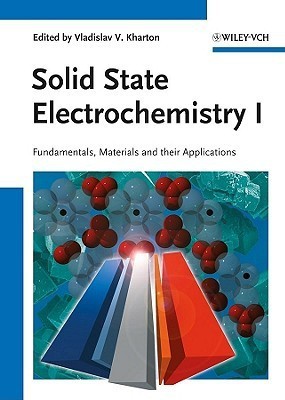Solid State Electrochemistry, 2 Volume Set(English, Hardcover, unknown)
Quick Overview
Product Price Comparison
The only comprehensive two volume handbook on this important and rapidly developing topic combines fundamental information with a brief overview of recent advances in solid state electrochemistry, primarily targeting specialists working in this scientific field. Particular attention is focused on the most important developments performed during the last decade, methodological and theoretical aspects of solid state electrochemistry, as well as practical applications. The highly experienced editor has included chapters with critical reviews of theoretical approaches, experimental methods and modeling techniques, providing definitions and explaining relevant terminology as necessary. Several other chapters cover all the key groups of the ion-conducting solids important for practice, namely cationic, protonic, oxygen-anionic and mixed conductors, but also conducting polymer and hybrid materials. Finally, the whole is rounded off by brief surveys of advances in the fields of fuel cells, solid-state batteries, electrochemical sensors, and other applications of ion-conducting solids. Due to the very interdisciplinary nature of this topic, this is of great interest to material scientists, polymer chemists, physicists, and industrial scientists, too. About the Author Vladislav Kharton is a principal investigator at the Department of Ceramics and Glass Engineering, University of Aveiro (Portugal). Having received his doctoral degree in physical chemistry from the Belarus State University in 1993, he has published over 230 scientific papers in international SCI journals, including 7 reviews, and coauthored over 40 papers in other refereed journals and volumes, 2 books and 2 patents. He is a topical editor of the Journal of Solid State Electrochemistry, and member of the editorial boards of Materials Letters, The Open Condensed Matter Physics Journal, and Processing and Application of Ceramics. In 2004, he received the Portuguese Science Foundation prize for Scientific Excellence. Table of Contents Preface FUNDAMENTALS, APPLICATIONS AND PERSPECTIVES OF SOLID STATE ELECTROCHEMISTRY - A SYNOPSIS Solid vs. Liquid State Thermodynamics and Kinetics of Charge Carriers Usefulness of Electrochemical Cells Materials Research Strategies: Bulk Defect Chemistry Materials Research Strategy: Boundary Defect Chemistry Nanoionics SUPERIONIC MATERIALS: STRUCTURAL ASPECTS Techniques Families of Superionic Conductors Current Status and Future Prospects DEFECT EQUILIBRIA IN SOLIDS AND RELATED PROPERTIES: AN INTRODUCTION Defect Structure of Solids: Thermodynamic Approach Basic Relationships between the Defect Equilibria and Charge Tranfer in Solids Examples of Functional Materials with Different Defect Structures ION-CONDUCTING NANOCRYSTALS: THEORY, METHODS AND APPLICATIONS Theoretical Aspects Applications and Perspectives Experimental Methods Review of the Current Experimental Data and their Agreement with Theory Overview and Areas for Future Development THE FUNDAMENTALS AND ADVANCES OF SOLID STATE ELECTROCHEMISTRY: INTERCALATION (INSERTION) AND DEINTERCALATAION (EXTRACTION) IN SOLID STATE ELECTRODES Thermodynamics of Intercalation and Deintercalation Kinetics of Intercalation and Deintercalation Methodological Overview SOLID STATE ELECTROCHEMICAL REACTIONS OF ELECTROACTIVE MICRO- AND NANOPARTICLES IN A LIQUID ELECTROLYTE ENVIRONMENT Methodological Aspects Theory Examples and Applications ALKALI METAL CATION AND PROTON CONDUCTORS: RELATIONSHIPS BETWEEN COMPOSITION, CRYSTAL STRUCTURE AND PROPERTIES Principles of Classification and General Comments Crystal-Chemistry Factors Affecting Cationic Conductivity Crystal Structural Screening and Studies of the Conduction Paths Conductors with Large Alkaline Ions Lithium Ion Conductors Proton Conductors CONDUCTING SOLIDS: IN THE SEARCH FOR MULTIVALENT CATION TRANSPORT Analysis of Trivalent Cation Transport Search for Tetravalent Cation Conductors OXYGEN ION-CONDUCTING MATERIALS Oxygen Ionic Transport in Acceptor-Doped Oxide Phases: Relevant Trends Stabilized Zirconia Electrolytes Doped Ceria Anion Conductors Based on Bi2O3 Transport Properties of Other Fluorite-Related Phases: Selected Examples Perovskite-Type LnBO3 (B=Ga,, Al, In, Sc, Y) and their Derivatives Perovskite-Related Mixed Conductors: A Short Overview La2Mo2O9-Based Electrolytes Solid Electrolytes with Apatite Structure POLYMER AND HYBRID MATERIALS, THEIR ELECTROCHEMISTRY AND APPLICATIONS Introduction Fundamentals Fluorinated Ionomer Membranes Non-Fluorinated Ionomer Membranes High Temperature PEMs Conclusion ELECTRONICALLY CONDUCTING POLYMERS Solid Organic and Inorganic Electrochemically Active Materials for Galvanic Cells Operating at Moderate Temperatures General Features of Doping-Induced Changes in Pi-Conjugated Polymers HIGH-TEMPERATURE APPLICATIONS OF SOLID ELECTROLYTES: GAS ANALYSIS, PUMPING AND CONVERSION Characteristics of a Current-Carrying Electrode on an Oxide Electrolyte Operating Modes Cell Materials Cell Designs Examples of Applications ELECTROCHEMICAL SENSORS: FUNDAMENTALS, KEY MATERIALS AND APPLICATIONS Operation Principles Materials Challenges Applications Interfacial Phenomena in Electrochemical Cells with Solid Electrolytes and Mixed Ionic-Electronic Conductors Adsorption Phenomena: Selected Aspects Surface Transport Interfacial Processes in Fuel Cells and Ceramic Membranes Grain Boundary Behavior of Micro- and Nanostructured Ion Conducting Ceramics Composite Solid Electrolytes Microelectrodes in solid state electrochemistry Batteries and supercapacitors: state-of-the-art, problems and perspectives Fuel cells: advances and challenges Oxygen- and hydrogen-permeable ceramic membranes Materials Science Aspects Relevant For High-Temperature Electrochemistry


